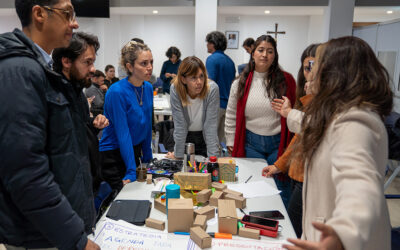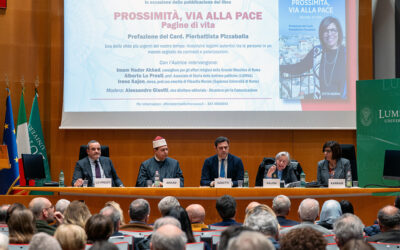 Ozieri, near the Sardinian town of Sassari, Italy. A group of Focolare members working in a parish wondered how they could use their talents to help the less fortunate. Learning of the Focolare’s NGO Azione per un mondo unito which assists disadvantaged people in the Third World, they decided to invest some time and energy into helping those people. The initiative that was launched four years ago has had many ups and downs. Egidia recounts: “The apartment flat we had received and furnished thanks to contributions from many people, was our sewing workshop. Then the parish priest asked us to give him the flat for a Ugandan priest who was going to be living there for a while. It seemed to be the end of our project, but then a very nice hall was given to us within the parish compound.” By then the group had broken up and they had to begin again from scratch! After a long time, work finally resumed. Women from several movements and associations began to arrive, even some who no longer went to church. They were all very enthusiastic and brought along everything needed: cloth, thread, silk, cotton, two sewing machines and even a machine for manufacturing knitted garments.
Ozieri, near the Sardinian town of Sassari, Italy. A group of Focolare members working in a parish wondered how they could use their talents to help the less fortunate. Learning of the Focolare’s NGO Azione per un mondo unito which assists disadvantaged people in the Third World, they decided to invest some time and energy into helping those people. The initiative that was launched four years ago has had many ups and downs. Egidia recounts: “The apartment flat we had received and furnished thanks to contributions from many people, was our sewing workshop. Then the parish priest asked us to give him the flat for a Ugandan priest who was going to be living there for a while. It seemed to be the end of our project, but then a very nice hall was given to us within the parish compound.” By then the group had broken up and they had to begin again from scratch! After a long time, work finally resumed. Women from several movements and associations began to arrive, even some who no longer went to church. They were all very enthusiastic and brought along everything needed: cloth, thread, silk, cotton, two sewing machines and even a machine for manufacturing knitted garments.  The workshop was all there, Anna Maria recounts: “There are thirty of us working with love and enthusiasm. We’re trying to build a positive relationship among us. We decided that the profits would be donated to the United World projects in Uganda. The parish priest also became involved, and the local population is kept informed through a diocesan newsletter. The sewing group attends markets and fairs where they sell their products. Egidia recounts: “Last year as we were preparing for a Christmas sale, we heard that the organisation in charge of the Sweets Fair – a local country feast whose profits are donated to the missions – was in difficulty. We all agreed to offer our support. Our sewing workshop was then transformed into an exhibition hall. It turned out a great success. This gesture allowed us to meet many more people who came to visit the exhibition and were taken in by the cheerful and harmonious atmosphere among us.”
The workshop was all there, Anna Maria recounts: “There are thirty of us working with love and enthusiasm. We’re trying to build a positive relationship among us. We decided that the profits would be donated to the United World projects in Uganda. The parish priest also became involved, and the local population is kept informed through a diocesan newsletter. The sewing group attends markets and fairs where they sell their products. Egidia recounts: “Last year as we were preparing for a Christmas sale, we heard that the organisation in charge of the Sweets Fair – a local country feast whose profits are donated to the missions – was in difficulty. We all agreed to offer our support. Our sewing workshop was then transformed into an exhibition hall. It turned out a great success. This gesture allowed us to meet many more people who came to visit the exhibition and were taken in by the cheerful and harmonious atmosphere among us.”  Anna Maria: “This is how we decided to call our workshop Laboramor (labour [of] love) which expresses our desire to live the art of loving. The faraway Ugandans are not our only objective. We begin from ourselves, building positive relationships with one another. We share our difficulties, the steps we can take to resolve difficult situations at home and at work. We feel like a family that helps one another in many ways great and small. And we entrust everything to God, convinced that He will continue to help us to bring ahead this beautiful adventure which He has begun for us.”
Anna Maria: “This is how we decided to call our workshop Laboramor (labour [of] love) which expresses our desire to live the art of loving. The faraway Ugandans are not our only objective. We begin from ourselves, building positive relationships with one another. We share our difficulties, the steps we can take to resolve difficult situations at home and at work. We feel like a family that helps one another in many ways great and small. And we entrust everything to God, convinced that He will continue to help us to bring ahead this beautiful adventure which He has begun for us.”
Give with joy
Give with joy




0 Comments